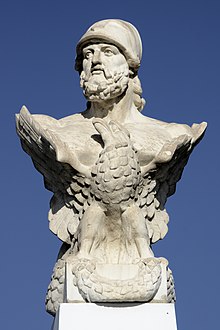
Back Kimon Afrikaans كيمون Arabic كيمون ARZ Kimon Azerbaijani Кимон Bulgarian Kimon Breton Cimó II Catalan Kimón Czech Kimon Danish Kimon German
Cimon | |
|---|---|
 | |
| Born | c. 510 BC Athens |
| Died | 450 BC (aged c. 59–60) Citium, Cyprus |
| Allegiance | Athens |
| Rank | Strategos (general) |
| Battles/wars | Persian Wars and Wars of the Delian League: |
| Children | Lacedaemonius Oulius Thessalus Cimon Miltiades Peisianax[1] |
Cimon or Kimon[pronunciation?] (Greek: Κίμων Μιλτιάδου Λακιάδης, translit. Kimōn Miltiadou Lakiadēs; c. 510 – 450 BC)[1] was an Athenian strategos (general and admiral) and politician.
He was the son of Miltiades, also an Athenian strategos. Cimon rose to prominence for his bravery fighting in the naval Battle of Salamis (480 BC), during the Second Persian invasion of Greece. Cimon was then elected as one of the ten strategoi, to continue the Persian Wars against the Achaemenid Empire. He played a leading role in the formation of the Delian League against Persia in 478 BC, becoming its commander in the early Wars of the Delian League, including at the Siege of Eion (476 BC).
In 466 BC, Cimon led a force to Asia Minor, where he destroyed a Persian fleet and army at the Battle of the Eurymedon river. From 465 to 463 BC he suppressed the Thasian rebellion, in which the island of Thasos attempted to leave the Delian League. This event marked the transformation of the Delian League into the Athenian Empire.
Cimon took an increasingly prominent role in Athenian politics, generally supporting the aristocrats and opposing the popular party (which sought to expand the Athenian democracy). A laconist, Cimon also acted as Sparta's representative in Athens. In 462 BC, he convinced the Athenian Assembly to send military support to Sparta, where the helots were in revolt (the Third Messenian War). Cimon personally commanded the force of 4,000 hoplites sent to Sparta. However, the Spartans refused their aid, telling the Athenians to go home – a major diplomatic snub. The resulting embarrassment destroyed Cimon's popularity in Athens; he was ostracized in 461 BC, exiling him for a period of ten years.
The First Peloponnesian War between Athens and Sparta began the following year. At the end of his exile, Cimon returned to Athens in 451 BC and immediately negotiated a truce with Sparta; however it did not lead to a permanent peace. He then proposed an expedition to Cyprus, which was in revolt against the Persians. Cimon was placed in command of the fleet of 200 warships. He laid siege to the town of Kition, but died (of unrecorded causes) around the time of the failure of the siege in 450 BC.
- ^ a b c d Byrne, Sean G. "Κίμων of Lakiadai". Athenian Onomasticon. Retrieved 1 February 2024.
© MMXXIII Rich X Search. We shall prevail. All rights reserved. Rich X Search